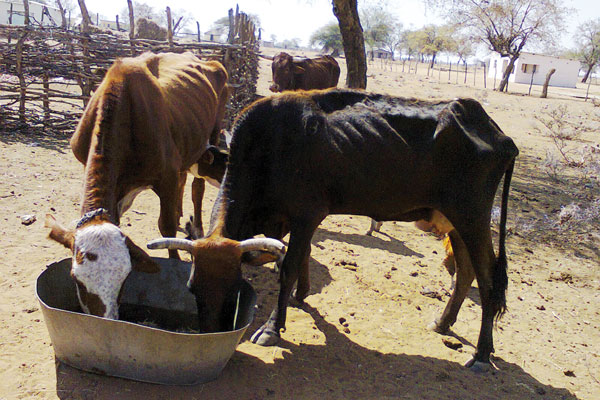
Not so long ago, Otilia Makanganise (38) of Tsumele village in Mwenezi district had been finding it difficult to fend for her family.
BY HAZVINEI MWANAKA
Living in an arid and remote area characterised by bad harvests due to poor rainfall patterns over the years has left many villagers, including Otilia, facing acute food shortages.
Otilia and her husband — who have four children — are both HIV positive and require a nutritious diet to augment the life-saving antiretroviral drugs they are taking.
“Last year I harvested 50kg of sorghum, but this year I only had 10kg and it did not last my family a month. We have been struggling to make ends meet,” said Otilia who, together with her husband, are unemployed.
“Life has been hard for us, we were living on the mercy of the Almighty,” she said, tears almost trickling down her eyes.”
There are a few boreholes in their area and this has presented serious challenges, as her village is located more than 3km from the nearest borehole, which caters for more than 132 homesteads.
“But thanks to the dam project, which has been implemented here, our lives have changed for the better. It has brought smiles to our faces, it will go a long way in helping to fend for our families,” she said.
- Chamisa under fire over US$120K donation
- Mavhunga puts DeMbare into Chibuku quarterfinals
- Pension funds bet on Cabora Bassa oilfields
- Councils defy govt fire tender directive
Keep Reading
Otilia’s hopes are for her children to complete their education.
The Tsvimborume weir dam and garden project were introduced after the World Food Programme (WFP), in conjunction with the Japanese government, launched the Productive Asset Creation (PAC) programme to benefit the Mwenezi villagers.

Otilia, a member of Rangarirai Varwere Nenherera Club, which consists of women living with HIV, is among members of the group benefiting from the projects.
“The project, which started in May, has helped us, we work for 15 days per month and four hours a day and at the end of every month we receive either cash or food stuffs. In May and June we received $55 for each month and for the other months that followed, we got 50kg maize, 10kg pulses and four litres cooking oil,” said Otilia.
Another club member Agnes Meso (46) said after the completion of the projects she hopes many lives will be improved including that of livestock.
“Many times during past seasons we struggled to get water and most of our livestock died, but with the introduction of the dam, we hope to have water throughout the year. The garden will also help, as we will grow vegetables during the dry season for selling, as well as sustaining us nutritionally and have water for our livestock as well as domestic use,” she said.
The Tsvimborume weir is expected to hold 12 915 cubic metres when completed and will provide water throughout the year, while the garden will cover an area of one hectare.
“Life has been hard for me after the little grains I harvested this year, but the project really has been a relief. We hope many projects like this will be done in every village,” Otilia said.
Apart from villagers being assisted with food aid, the project also has been beneficial in training.
“Not only are we having food aid from this programmes, we also have training projects, were we are taught about health issues, especially visiting health centres for check-ups,” said Otillia.
The supervisor at Mwenezi Development Training Centre (MDTC), Farai Mukwende said the training projects are targeted at women, children as well as the ill.
“When projects are being done like the construction of the Tsvimborume dam, we have meetings with women and children, were we encourage them to go to health centres so that growth of their children is monitored. They are also encouraged to adhere to treatment,” he said.
During the launch of the project recently, WFP country director, Eddie Rowe said the project is a beginning of a long road in eradicating poverty in the area.
“In two years’ time we want to ensure that each and every individual in the community will have enough, our footprints in Masvingo will be recognised,” he said.
The Japanese embassy this year extended a grant of US$ 1,5 million to WFP’s PAC programme.
Japanese ambassador to Zimbabwe, Yoshi Hiraishi said the programme seeks to strengthen the power of resistance of the local community to natural disasters.
“We want to help the community build viable assets, such as this dam with partners. I am sure this programme will serve long term food security of the local community, which we support wholeheartedly,” he said.
According to WFP, due to the drought conditions in the 2014/15 agricultural season, which caused a drop in crop production, 83 000 people in Zvishavane and Mwenezi are estimated to suffer from hunger during the height of the 2015/16 lean season.











